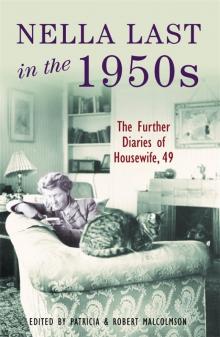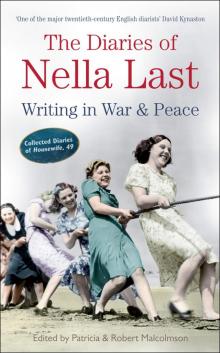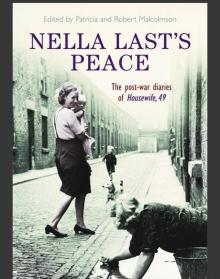- Home
- Patricia Malcolmson
Nella Last in the 1950s Page 30
Nella Last in the 1950s Read online
Page 30
*The launch of a large boat was seen in Barrow as a major event, and was attended by many of the men who had helped build her.
*These were projects in the late 1940s concerning colonial food production and economic development, both of which were seen as failures. The attempt to grow peanuts in Tanganyika became notorious as a waste (however well intended) of public funds.
*Mrs Newall had been invited to take tea at Nella’s home on 17 March 1950, and though she ‘ate a good meal, she was depressed and down as she spoke of her lonely life, and of her husband’s preference for Dorothy Crosbie, who, “though she could earn £500 a year as a librarian, is content to steal my husband and live off him”.’ Mrs Newall’s marital woes are detailed several times in Nella Last’s Peace (pp. 65–6, 69–70, 74, 269–72, and 284).
*Nella, who did not hesitate in her diary to render harsh judgements about others, had written almost rhapsodically about Sheila just prior to her marriage. ‘Sheila is such a charming, well educated and well bred girl. Her family are all the same – love for each other and happiness in their parents – and the same friendly approach to Geoff’s people made us think what a treasure of a wife he would get.’ Nella went on to praise ‘the warmth and depth of Sheila’s nature, all her breadth of outlook, her dainty, charming ways and desire to be admitted into his family’ (11 July 1950).
**On 4 November, Cliff returned to Barrow after travelling for a couple of months, including a stay in Paris and journeys in Spain.
*There was a strong demand for these dressed dollies. ‘I’ve made dresses and matching bonnets, pyjamas and dressing gowns, aprons by the dozens, afternoon tea clothes, and napkins – anything the good little scraps of material will cut, yet still they clamour for more’, Nella wrote on 16 November. ‘Mrs Higham says frankly, “The stall holders say they are going to queue before the rush starts”. Seems no little girls are taught to make their own dollies’ clothes nowadays and mothers are often too busy.’
*Cliff was preparing to leave Barrow for London, although he had injured his back working in the garden and was in considerable pain (and did in fact have to delay his departure).
*Will was not alone in this judgement. ‘I’d a good laugh over Arthur’s letter,’ Nella wrote three days later, on 29 October, ‘as he demanded why I wasted a perfectly good “hunch on an election forecast. Why not keep it for your football coupon or the winner of the Derby?”’ Although the Conservatives won the election, the Labour Party actually got more votes.
*Food rationing was not finally abolished until mid-1954.
*Around 1,000 people were in attendance, and the Shipyard Band played the national anthem.
**Cliff was about to sail to Sweden, to start his return voyage to Australia.
*See the note for 26 January 1950.
*The film of Tennessee Williams‘s, directed by Elia Kazan, was released in 1951.
*George was Mrs Higham‘s husband, who worked at Vickers-Armstrongs.
*A few days later Nella wrote of Will‘s attachment to his car: ‘after myself, it’s his chief anchor to life and living’ (28 May 1952).
*Nella and Will were soon to travel to London to stay for a fortnight with Arthur and his family.
*These villainous images were almost certainly intended to be of Chinese (or possibly North Korean) figures.
**Nella seems to be saying that these imported products of American popular culture were both betraying the youth of Britain and a drag on its fragile economy (because they would have had to be paid for with scarce dollars).
*The younger Lasts’ home was at 64 Blake Road, N11; the nearest Tube station was and still is Bounds Green on the Piccadilly line, about half a mile away.
*Early the next morning, ‘I looked down at the untidy line of washing, and crept down in my dressing gown and brought all in, smiling to myself at my deep conventional streak which made me feel so horrified at the sight.’
**Will was not always sensitive to the protocols for using the escalators in Tube stations. ‘My husband has been unpopular a few times’, Nella wrote on 1 July. ‘In spite of my warnings – and given by Cliff – to keep always to the right, he will use the left, and has been bumped as well as told curtly “keep to the right”.‘ (Nella mistakenly writes ‘left’ instead of ‘right’ in quoting this admonition.)
*‘You carried flowers for Shan We as if he was a person’, Will later remarked (20 July).
*The following appendix presents selections from the one significant facet of public life in 1953 that she wrote about at length – the mobilisation in Barrow in February of help for flood victims in other parts of the country.
*Author of the famous Book of Household Management (1861).
*Their sons died at younger ages. Arthur, whose health had been poor through much of his adulthood – his mother worried a lot about him – died in 1979 in his mid-sixties; Cliff died in 1991.
*A succinct account of these floods is presented in David Kynaston, Family Britain, 1951–57 (London: Bloomsbury, 2009), pp. 257–9. At Barrow’s WVS Club meeting on 2 February 1953 ‘quite a number wondered if “H and atom bomb trials could possibly be the cause of the high tides”’ that had inundated some coastal areas.
*Will, for a man, was even slighter than Nella: he was 5 feet 3 inches in height and weighed 8 stone 8 pounds (8 June 1951).
*British Railways and the Post Office were delivering relief parcels free of charge.
*Mass-Observation dropped the hyphen from its name in 2006, thus becoming Mass Observation. We have chosen in this appendix consistently to adopt the current usage, except when the hyphen is used in book titles.

 Nella Last in the 1950s
Nella Last in the 1950s The Diaries of Nella Last
The Diaries of Nella Last Nella Last's Peace
Nella Last's Peace